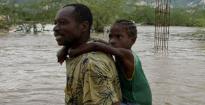America Abandons Haiti, Again
 David Rieff writes:
David Rieff writes:
In the immediate aftermath of the earthquake that leveled much of Port-au-Prince last January 12, there was a great deal of talk among the great and the good that this time it was going to be different. Not only would the Haitian capital be rebuilt and its 600,000 homeless housed once more, but at long last the major international donors would not leave once this (in reality, appalling) status quo ante had been restored. This time they would not withdraw until real progress had been made in bringing Haiti out of the crushing poverty that had been its burden since it wrested its independence from France in 1804.
At first, these promises came fast and furious. President Obama declared that Haiti would become a major priority for American policymakers and that, as he put it, not only would the United States help the Haitian people get back on their feet, but a new Haiti would be built out of the ruins of the old. Former president Bill Clinton, who had been appointed the U.N. special envoy for Haiti almost eight months before the earthquake, went further. "Everybody that has seriously followed Haiti for a long time,” he said, “believed Haiti had the best chance in our lifetime to break the chains of its past, to build a true and modern state," adding: "I won't feel successful if all we do is get it back to where they were the day before the earthquake came.” And Secretary of State Hillary Clinton, on a visit to Port-au-Prince shortly after the earthquake, seemed to be promising that even the post-earthquake reconstruction would be undertaken in the context of long-term development, saying that the goal should be "not just taking a building that's half-demolished and trying to patch it together, but thinking about what should this whole street look like, what should this neighborhood look like?”
The psalmist’s warning, “put not your trust in princes,” is always good advice (even in the case of a progressive prince whose rallying cry is the contentless slogan, “Yes, we can!”). And, in retrospect, to have believed any of this sanctimonious, self-congratulatory rubbish looks like just what it is: a particularly egregious example of the triumph of hope over experience. But in fairness, the promise of $5.3 billion in reconstruction and development aid from the major international actors made at a U.N.-sponsored donor conference last march, including $1.5 billion from the United States, at least gave those hopes a spar on which to alight.
Lots of luck. While the immediate relief efforts, like paying for supplies for the tent cities where hundreds of thousands of Haitians who lost their homes still live, have continued to be funded, and private relief agencies continue to operate at full tilt in Haiti, the international donors have done almost nothing to meet their pledges. Most of the promised U.S. rebuilding money for Haiti remains tied up in Congress, with the administration and the Republicans blaming each other for the delay. Globally, as of mid-July, only 2 percent of the monies promised had been handed over. Getting to 25 percent by the early part of 2011 would represent an enormous accomplishment, and of course realistically is almost certainly too ambitious a goal.
In the real world, where the poor might actually do better if the rich delivered more but promised less, there is little reason to see how it could be otherwise. For all the bluff talk at the time of the earthquake about the global significance of what had taken place, and the worldwide outpouring of sympathy that it engendered, Haiti soon went from being a lead story on the news to being a subject that, outside of Haiti itself and of the Haitian Diaspora, had become largely of concern to activists, aid workers, and officials of donor governments and of the United Nations. In this, the Port-au-Prince earthquake has followed the same trajectory as Cyclone Nargis in the spring of 2009, and the Asian tsunami of late-December, 2004. Elizabeth Kubler-Ross’s five stages of grief—denial, anger, bargaining, depression, and acceptance—is an extremely debatable generalization about how people deal with the imminent prospect of their own deaths. But a case can be made that huge natural disasters in the poor world, like the Port-au-Prince earthquake, do engender a fairly predictable staged progression of reactions in the rich world: shock, followed by intense interest and demands for action, followed by a calming down when politicians make a show of saying they will act, followed by the story being supplanted by other stories, followed by forgetfulness. Where disasters are concerned, the donor governments and their donating publics are like serial monogamists: they obsess, but sooner or later, they move on.

